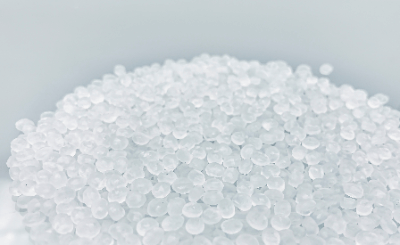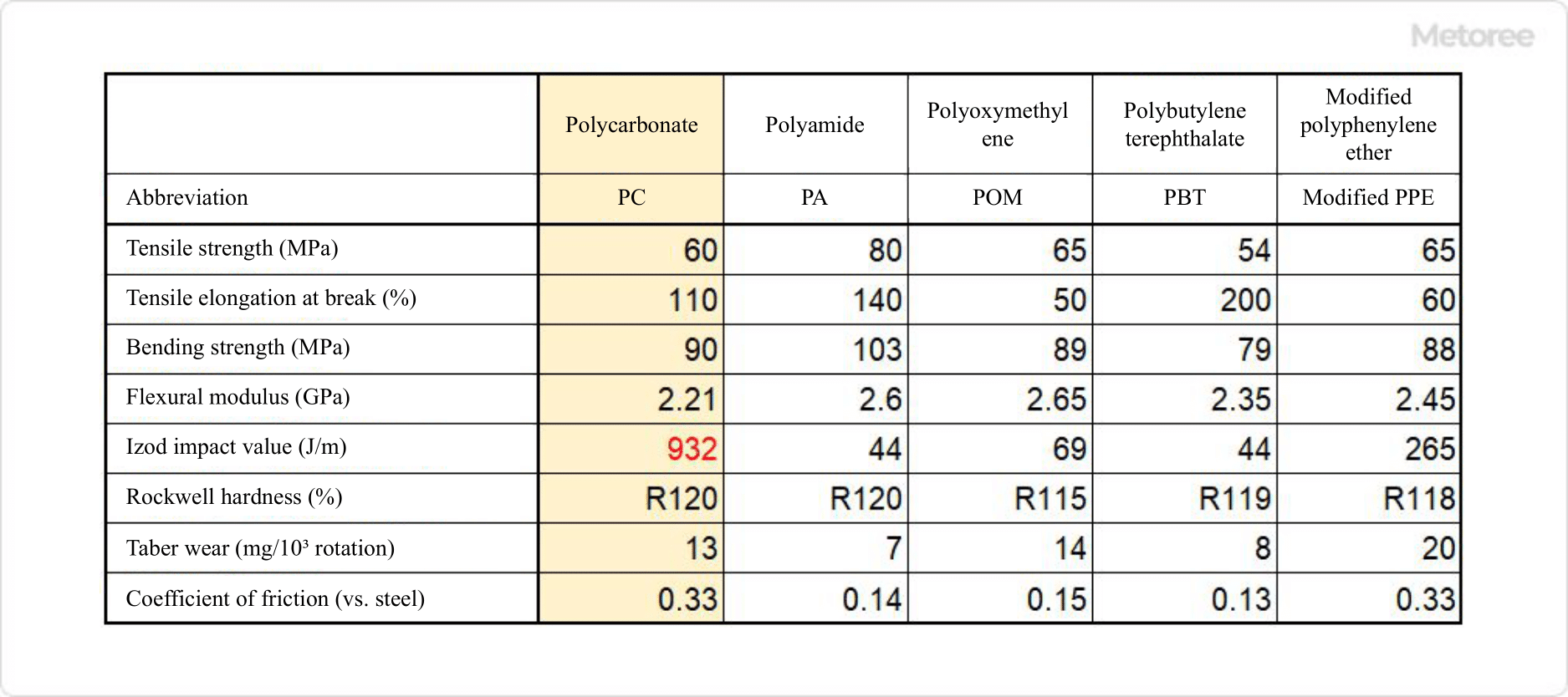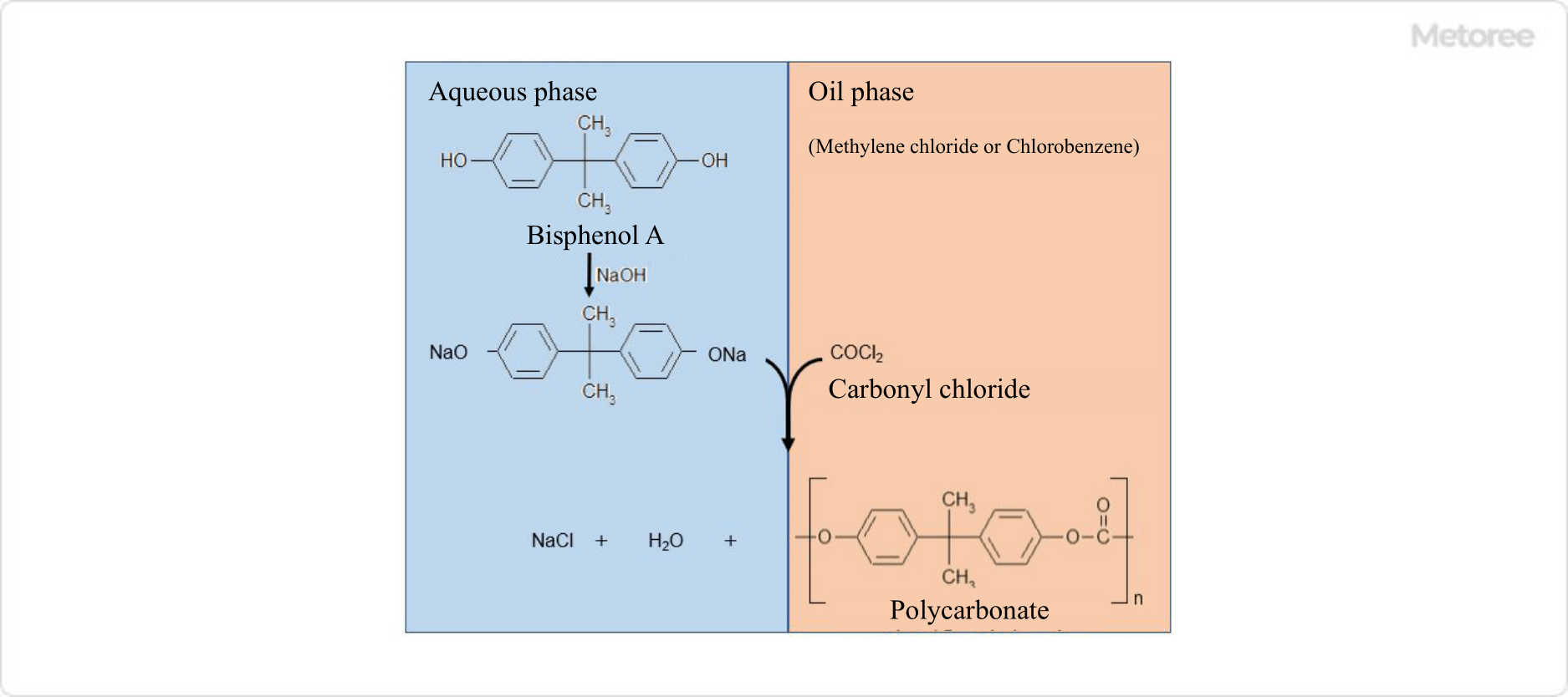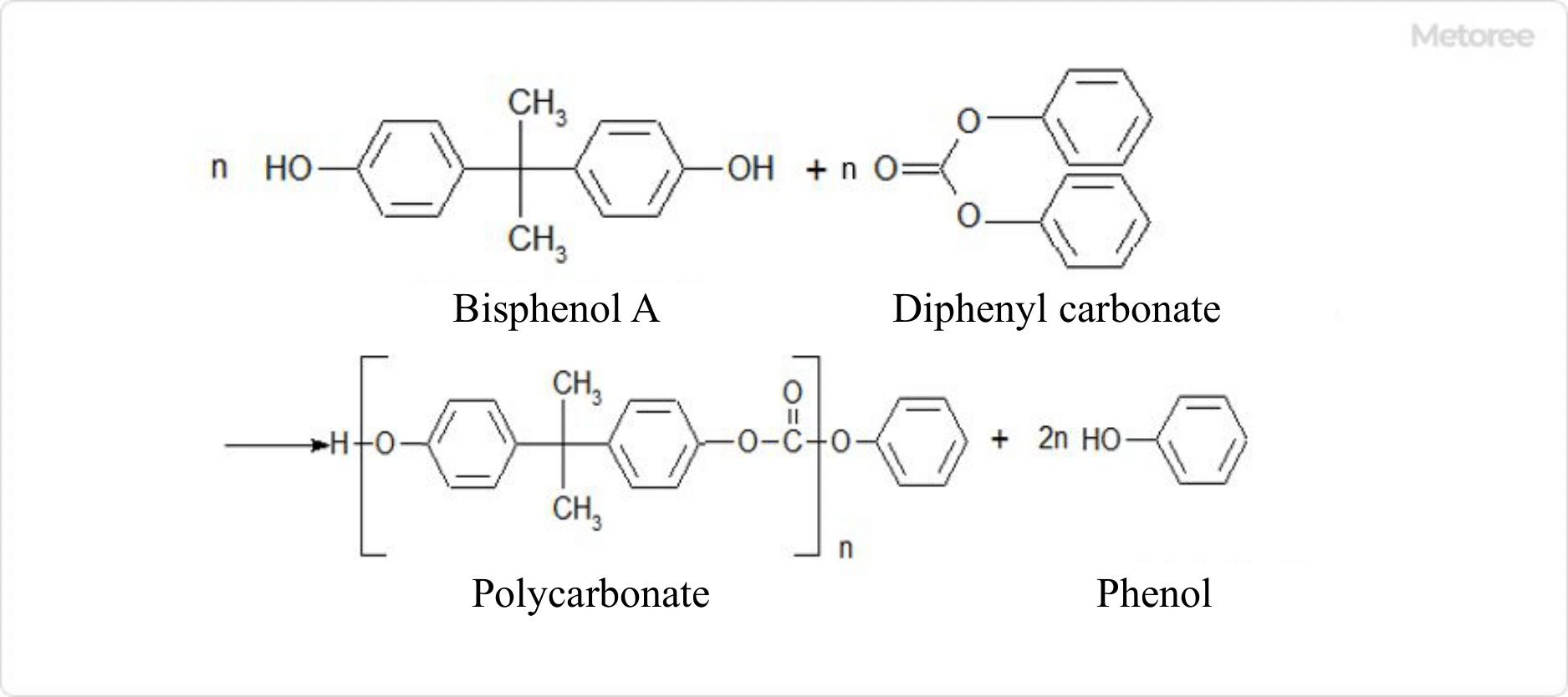All Categories
History












This section provides an overview for polycarbonate resins as well as their applications and principles. Also, please take a look at the list of 15 polycarbonate resin manufacturers and their company rankings. Here are the top-ranked polycarbonate resin companies as of February, 2026: 1.Emco Industrial Plastics, Inc., 2.Chi Mei Corp., 3.National Plastics & Seals, Inc..
Table of Contents
Categories Related to Polycarbonate Resins


Figure 1. Five major general-purpose engineering plastics and their physical properties (Reference: Chemistry Handbook, 5th Edition)
Polycarbonate Resin is a type of engineering plastic and one of the five major general-purpose engineering plastics. Among general-purpose engineering plastics, polycarbonate resin is the only one that is colorless and transparent, and its transparency is so high that it can be compared to that of glass.
It also has the highest impact resistance of all general-purpose engineering plastics, and because it contains two benzene rings in its main chain, it is self-extinguishing, meaning that it will not spread even if set on fire.
Polycarbonate Resin is highly processable, as it is compatible with most of the basic molding techniques used for plastics. However, although cracking and breakage rarely occur, it should be noted that it is susceptible to fatigue and scratching, and that it is weak against alkalis and organic solvents.
Polycarbonate Resin is used in a great many applications because of its excellent resistance to a wide variety of conditions and its ease of processing.
The following are examples of applications for Polycarbonate Resin along with its characteristics:
Due to its high transparency, polycarbonate resin is used in optical applications such as eyeglass lenses, camera lenses, and CD and DVD substrates.
Because of its strong impact resistance, it is used for bulletproof materials, etc., and there is almost no risk of cracking when used in general environments.
Because it is resistant to ultraviolet rays and does not deteriorate easily, it maintains its high strength for a long period of time when used outdoors. It is used for roofing materials, solar panel surfaces, and other outdoor applications, as well as for automobile headlamp lenses, roof rails, and door handles.
In recent years, it has also been adapted to molding methods using 3D printers, and its use is expanding more and more.
With its high dimensional stability, polycarbonate resin is used for smartphone cases and other applications.
There are two industrial production methods for polycarbonate resin: interfacial polymerization and ester exchange. The density varies depending on the manufacturing method, and the addition of modifiers to polycarbonate resin can make it an even better resin material.

Figure 2. Reaction equation of the interfacial polymerization method
In this method, polycarbonate is produced by adding carbonyl chloride to a suspension solution of bisphenol A in aqueous sodium hydroxide solution and methylene chloride or chlorobenzene, which undergoes a condensation polymerization reaction at the interface between the aqueous and oil phases.
Compared to the ester exchange method, the reaction conditions are milder, and polycarbonates of a wide range of molecular weights, from low to high, can be produced.
After polymerization, polycarbonate resin is dissolved in the oil phase, and granular polycarbonate is obtained through the separation, neutralization and purification process, polymer recovery process, and drying process.

Figure 3. Reaction equation for the ester exchange method
In this method, bisphenol A and diphenylcarbonate are melt-mixed in the presence of a catalyst to produce polycarbonate through polycondensation while recovering phenol under high temperature and reduced pressure without the use of solvents. The recovered phenol is reused as a raw material for diphenylcarbonate.
The resulting polycarbonate is obtained in a molten state and can be pelletized into products, making this method of synthesis simpler than the interfacial polymerization method in terms of post-processing.
Polycarbonate Resin is used in an extremely wide range of applications, and production facilities are located in various regions. By capital, American manufacturers account for 36%, European manufacturers, mainly from Germany and Belgium, 25%, and Japanese manufacturers, 38%.
Polycarbonate resin is a thermoplastic resin that softens when heated. It can be cut like acrylic resin, bent with heat, and welded with solvents.
It can also be used in a manner similar to metalworking to create workpieces that take advantage of its properties. For this reason, there are a number of businesses that make their living processing polycarbonate resin.
*Including some distributors, etc.
Sort by Features
Sort by Area

Emco Industrial Plastics, LLC. (Emco) has operated out of Cedar Grove, New Jersey for over 30 years. The company is a manufacturer and distributor of custom industrial plastics, rubber, and foam-based products for medical grade plalstic, food & beverage, chemical processing, and OEM industries. Some of the materials the company engineers are industrial plastics, neoprene, natural rubber, polyurethane, and natural sponge. The company offers services such as cutting to size, laser cutting, plastic welding, and injection molding. The company also manufactures custom machined components.

Ensinger, founded in 1966 in Germany as solely a manufacturer of plastics for commercial customers, has grown to manufacture performance and engineering thermoplastics for numerous industries worldwide. The company's products include plastic compounds, extruded semi-finished products, injection-molded finished parts, as well as compressed and cast-formed parts. Ensinger serves the plant engineering, building construction, automotive, aerospace, medical, and food markets, among many other industries. The company has over 30 international production and sales locations, serving customers across the globe.



Colibrys, a joint company established in 2001 and headquartered in Yverdon-les-Bains, Switzerland, is a manufacturer, designer, and supplier of micro-electro-mechanical system sensors and electronic machines. The company offers a wide range of products including mechanical power transmissions, power generation systems, and seismic sensors. These products are used in industries such as aerospace, defense, energy, and transportation. Their products are utilized for various applications including measuring acceleration, inclination, and seismic activity, enabling data collection for various critical applications. The company also offers services such as aerial refueling and air delivery systems.

Mitsubishi Gas Chemical Company Inc., established in 1918 and headquartered in Tokyo, Japan, is a chemical manufacturer that makes basic and fine chemicals and functional materials. The company has two business divisions, namely basic chemicals and functional chemicals, and its product portfolio includes electronic industry cleaning agents, MMA derivatives, hydrogen peroxide, xylene separation products, and laminated materials for printed circuit boards. In 1981, the company took the first step towards geothermal power development, and today, it is involved in geothermal power projects in five locations, including the 50,000-kilowatt Sumikawa Geothermal Power Plant, where it commenced operations in 1995.

LG Chem is a South Korean manufacturer and supplier of petrochemicals, plastics, and batteries for several sectors, such as automotive, electronics, and energy storage operated under LG Corporation. Established in 1947 and it expanded its operations to include a wide range of industries, including electronics, energy, and automotive. Their products are battery cells for electric vehicles and energy storage systems, electronic materials for smartphones and TVs, and advanced materials for automotive parts and construction. In 2020, the company was ranked first in the Dow Jones Sustainability Index for the chemicals sector, for outstanding performance in environmental, social, and governance practices.

Chimei Corporation is a Taiwanese manufacturer of electronics and chemical products, including LCD panels, optical films, and specialty chemicals. The company was established in 1960 and has since expanded its operations to include a wide range of products and services.products are used electronics, automotive, and construction. The company's plastics, for example, are used in the production of electronic components, automobile interiors, and medical devices. In 2021, the company received the Taiwan Corporate Sustainability Award, which renown companies that demonstrate outstanding performance in environmental, social, and governance (ESG) practices.

Idemitsu Kosan Co., Ltd., established in 1911 in Tokyo, Japan, is a manufacturer and supplier in the energy and chemicals sector. The company offers a wide range of products, including petroleum, lubricants, petrochemicals, and more. These products play a critical role in fueling industries such as automotive, manufacturing, and construction. Idemitsu Kosan Co., Ltd. also provides quality, eco-friendly solutions. They aim to enhance energy efficiency and reduce environmental impact, ensuring a great future for both their customers and the planet.

TEIJIN LIMITED, founded in Chiyoda-ku, Tokyo, in 1918 is a manufacturer of aramid, carbon fibers & composites, films, resins & plastics. The company's product portfolio includes polycarbonate (PC) resin, polyphenylene sulfide (PPS) resin, and molded parts and Pharmaceutical & Medical Equipment. Their products are used in industries such as Food and Beverage Processing, Pharmaceutical and Biotechnology and Chemical and Petrochemical and construction. The company also provides services including national distribution, product selection, customized services, technical support and customer service.

Saudi Basic Industries Corporation (SABIC) is a Saudi Arabian manufacturer of chemicals and intermediates established in 1976 and based in Riyadh. The company produces various basic and performance chemicals, as well as intermediates, polymers, agri-nutrients, and specialty composites. They serve companies in the industrial sectors of roughly 50 countries, with a workforce of more than 31,000 employees. SABIC has secondary large facilities in Yanbu and Al-Jubail, and is a parent company of over 38 subsidiaries and affiliate operations in Asia, Africa, Europe, and North America.

Covestro, founded in Leverkusen, NRW, in 2015 is a manufacturer of polymer materials and their components. The company's product portfolio includes polycarbonate, polyurethane, coatings, adhesives and specialties. their products find applications in packaging, industrial applications, and electronics to enhance the performance and properties of polymer materials. They serve markets such as construction, sports and leisure, electronics, fashion, and health and cosmetics. The company provides services such as Product Selection Guidance, Engineering Support, New Product Design and Development and Custom Manufacturing.

National Plastics and Seals was founded in 1985 and headquartered in Schaumburg, Illinois. The company is an ISO 9001:2015 certified manufacturer and supplier of precision machined & fabricated plastic parts to global customers in industries as diverse as aerospace, heavy equipment, point of purchase, semiconductors, and water treatment. The company works with a variety of materials such as acrylic, acetal, polycarbonate, Teflon, and PET. The company’s primary products include heat shrink tubing, insulation sleeving, rubber O-rings, and plastic resin. The company can make custom materials to specifications even to military-grade standards.

Mitsubishi Chemical America is based in New York, USA, and is a manufacturer and distributor of chemical products established in 2017 and functioning as the regional headquarters for Japan’s Mitsubishi Chemical Corporation in the Americas. The company’s product lineup includes polymers for industrial applications, such as engineering plastics, elastomers, and ion exchange resins. It also offers standard film products such as optical reflective sheets and adhesive tapes, as well as specialty films for semiconductor and 3D imaging materials. The company mainly serves clients in the automotive, aerospace, and defense industries.

Samyang Corporation is a South Korean manufacturer and distributor of a diverse range of products, including petrochemicals, food ingredients, and packaging material such as ethylene, propylene, and butadiene, food ingredients like high-fructose corn syrup and maltodextrin, and packaging materials including PE films and PVC films. Established in 1924, their products are in pharmaceuticals, food additives, and industrial chemicals. The company is particularly known for its development of premium quality pharmaceutical ingredients and is a excellent supplier of such ingredients to the global pharmaceutical industry. Won 2021 Korea Green Management Grand Prize for excellent environmental management performance.

Formosa Chemicals & Fibre Corporation (FCFC) is a Taiwanese supplier of petrochemical company that produces a wide range of products, including plastics, synthetic fibers, and petrochemicals operated by Formosa Plastics Group. Established in 1954, their products are used from automotive and electronics to packaging and construction. In 2020, the company was named one of the Top 100 Sustainable Companies in the World by Corporate Knights and received the Taiwan Corporate Sustainability Award. FCFC has also been renowned for its contributions to the circular economy and waste reduction initiatives, receiving the Circular Economy Leadership Award and the Taiwan Circular Economy Award.
Ranking as of February 2026
Derivation Method| Rank | Company | Click Share |
|---|---|---|
| 1 | Emco Industrial Plastics, Inc. |
17.1%
|
| 2 | Chi Mei Corp. |
10.1%
|
| 3 | National Plastics & Seals, Inc. |
9.9%
|
| 4 | MITSUBISHI GAS CHEMICAL COMPANY, INC. |
7.5%
|
| 5 | Ensinger |
6.8%
|
| 6 | SABIC |
6.5%
|
| 7 | Formosa Chemical & Fiber Corporation |
6.1%
|
| 8 | Sumitomo Bakelite Co., Ltd. |
5.4%
|
| 9 | TEIJIN LIMITED |
5.2%
|
| 10 | Idemitsu Kosan Co.,Ltd. |
5.2%
|
Derivation Method
The ranking is calculated based on the click share within the polycarbonate resin page as of February 2026. Click share is defined as the total number of clicks for all companies during the period divided by the number of clicks for each company.Number of Employees
Newly Established Company
Company with a History
*Including some distributors, etc.
*Including some distributors, etc.
| Country | Number of Companies | Share (%) |
|---|---|---|
 Japan
Japan
|
4 | 36.4% |
 Republic of Korea
Republic of Korea
|
2 | 18.2% |
 Taiwan
Taiwan
|
2 | 18.2% |
 United States of America
United States of America
|
1 | 9.1% |
 Germany
Germany
|
1 | 9.1% |
 United Kingdom
United Kingdom
|
1 | 9.1% |
169 products found
169 products
Soshin Kako Co., Ltd.
480+ people viewing
Last viewed: 21 hours ago
■Application examples ・Machine guard cover ・Roof and facade glazing ・Cover for billboards, signs and LED lights ・Soundproof wall ・Carport ·tra...
Kotec
280+ people viewing
Last viewed: 21 hours ago
"KOTEX" has been established in various fields as a high -quality recycled recycled carbonate resin brand. We offer a wide variety of grades to sup...
3 models listed
Soshin Kako Co., Ltd.
520+ people viewing
Last viewed: 19 hours ago
■Application examples ・Glazing for special vehicles ・Glazing of police vehicles ・Motorcycle windshield ・Equipment cover ・Train glazing ・Prote...
Kotec
440+ people viewing
Last viewed: 9 hours ago
"KOTEX" has been established in various fields as a high -quality recycled recycled carbonate resin brand. We offer a wide variety of grades to sup...
2 models listed
Kotec
210+ people viewing
Last viewed: 21 hours ago
"KOTEX" has been established in various fields as a high -quality recycled recycled carbonate resin brand. We offer a wide variety of grades to sup...
12 models listed
Kotec
360+ people viewing
Last viewed: 15 hours ago
"KOTEX" has been established in various fields as a high -quality recycled recycled carbonate resin brand. We offer a wide variety of grades to sup...
3 models listed
Kotec
780+ people viewing
Last viewed: 1 hour ago
"KOTEX" has been established in various fields as a high -quality recycled recycled carbonate resin brand. We offer a wide variety of grades to sup...
Kotec
340+ people viewing
Last viewed: 9 hours ago
"KOTEX" has been established in various fields as a high -quality recycled recycled carbonate resin brand. We offer a wide variety of grades to sup...
4 models listed
Kotec
320+ people viewing
Last viewed: 21 hours ago
"KOTEX" has been established in various fields as a high -quality recycled recycled carbonate resin brand. We offer a wide variety of grades to sup...
2 models listed
Midorikawa Chemical Industry Co., Ltd.
290+ people viewing
Last viewed: 21 hours ago
■Summary The most distinctive feature of Twin Carbo is its hollow structure, and the air layer creates a high insulation effect, making it approxim...
4 models listed
Midorikawa Chemical Industry Co., Ltd.
320+ people viewing
Last viewed: 1 hour ago
■Summary A polycarbonate panel made of two integrally molded layers with an air space inside. Polycarbonate, which is lightweight, hard to break, p...
7 models listed
Midorikawa Chemical Industry Co., Ltd.
210+ people viewing
Last viewed: 21 hours ago
■Summary Polykanami is a weather-resistant transparent corrugated sheet made of highly impact-resistant polycarbonate. Not only is it transparent, ...
11 models listed
Midorikawa Chemical Industry Co., Ltd.
430+ people viewing
Last viewed: 2 hours ago
■Summary Teijin's polycarbonate resin sheet "Panlite®" sheet is an engineering plastic sheet that has the highest impact resistance of all plastics...
9 models listed
Midorikawa Chemical Industry Co., Ltd.
320+ people viewing
Last viewed: 2 hours ago
■Summary Teijin's polycarbonate resin sheet "Panlite®" sheet is an engineering plastic sheet that has the highest impact resistance of all plastics...
7 models listed
Midorikawa Chemical Industry Co., Ltd.
450+ people viewing
Last viewed: 2 hours ago
■Summary Iupilon Sheet is a sheet film made from Iupilon. ■Applications ・Car meter cover ・Display filter ・Gas station display board ・Nameplate...
10 models listed
Midorikawa Chemical Industry Co., Ltd.
350+ people viewing
Last viewed: 9 hours ago
■Summary AGC's transparent material is made from strong and lightweight polycarbonate resin. It exhibits excellent performance in terms of safety, ...
10 models listed
Midorikawa Chemical Industry Co., Ltd.
200+ people viewing
Last viewed: 21 hours ago
■Summary It contributes to all industrial fields as a highly reliable plastic that has impact resistance, transparency, heat resistance, cold resis...
10 models listed
Midorikawa Chemical Industry Co., Ltd.
280+ people viewing
Last viewed: 16 hours ago
■Summary A polycarbonate resin board with excellent impact resistance, heat resistance, and cold resistance. It is a non-combustible material that ...
10 models listed
Midorikawa Chemical Industry Co., Ltd.
480+ people viewing
Last viewed: 8 hours ago
■Summary PC mirror is a mirror plate made of polycarbonate resin with aluminum vapor deposited on it. In addition to being lightweight and unbreaka...
2 models listed
TP Giken Co., Ltd.
360+ people viewing
Last viewed: 21 hours ago
Sumitomo Bakelite Co., Ltd.
720+ people viewing
Last viewed: 9 hours ago
■Product introduction Polycarbonate Ace is a polycarbonate resin board that has excellent impact resistance, transparency, cold resistance, heat re...
Sumitomo Bakelite Co., Ltd.
440+ people viewing
Last viewed: 21 hours ago
■Product introduction This is a grade that can be used for high-spec applications such as liquid crystal display covers, which have particularly st...
Sumitomo Bakelite Co., Ltd.
520+ people viewing
Last viewed: 2 hours ago
■Product introduction ・This is a double-sided antistatic plate product that has antistatic performance added to regular polycarbonate. - Double-si...
Matsubara Shoji Co., Ltd.
340+ people viewing
Last viewed: 21 hours ago
■Ultraviolet absorber is added to the raw material polycarbonate to ensure high durability. - Excellent screen printability and excellent UV ink ad...
Matsubara Shoji Co., Ltd.
320+ people viewing
Last viewed: 21 hours ago
■Ultraviolet absorber is added to the raw material polycarbonate to ensure high durability. - Excellent screen printability and excellent UV ink ad...
Matsubara Shoji Co., Ltd.
480+ people viewing
Last viewed: 2 hours ago
■Ultraviolet absorber is added to the raw material polycarbonate to ensure high durability. - Excellent screen printability and excellent UV ink ad...
Jiangsu Henglihong Technology Co., Ltd.
200+ people viewing
Last viewed: 3 hours ago
■Overview Cryogenic Deflash Media-PC are high-performance sandblasting particles made of polycarbonate monofilaments.They are widely used to remove...